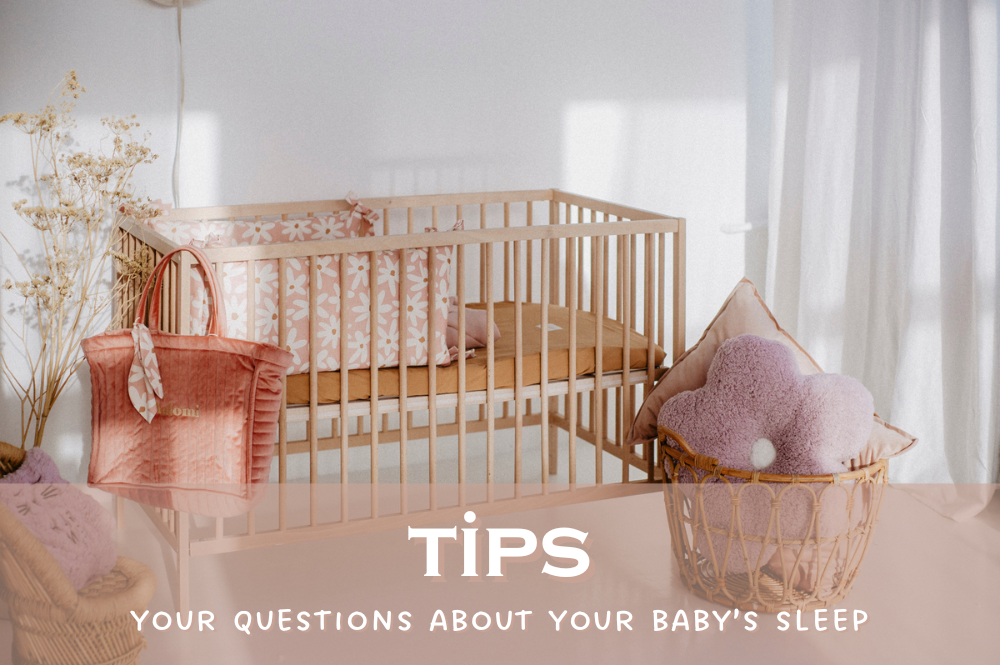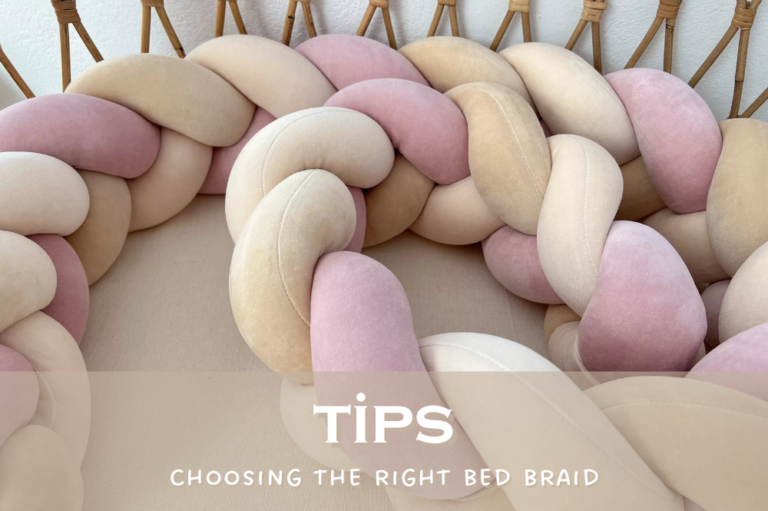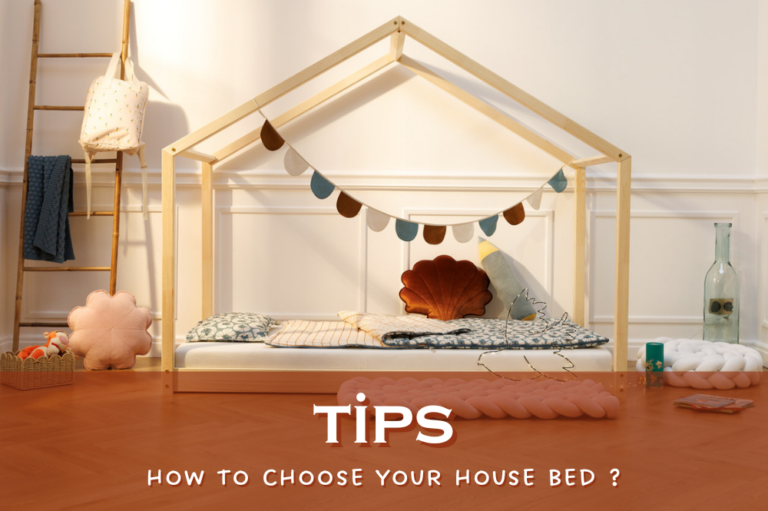Ksenia Gerasimova is a certified specialist (Family Sleep Institute) in sleep for children aged 0 to 6, and is also the founder of MesNuitsProfondes. She helps families to (re)find sleep through individual consultations and independent sleep programmes, with or without support. Her sessions are always personalised and tailored to the baby and the parents. You can find her at www.mesnuitsprofondes.eu
Today she answers your questions about baby’s sleep!
How can a 12-month-old baby learn to sleep on their own without a feed?
You can start by separating feeding from sleep, by putting the last feed of the evening before the bedtime ritual.
Establish a good routine in the evening to soothe and relax your baby, which will also give them some reference points. You should also remember to structure the night feeds.
You can then help your baby to fall asleep independently, so that they can soothe themselves in ways other than feeding.
Choose the method that seems to suit you and your baby best and implement it, adapting it to your family.
My 2 year old daughter refuses to sleep in the bed we bought a fortnight ago. What should I do about this?
It’s advisable to change from a cot to a crib around the age of 3.
However, you can switch earlier if your baby has outgrown the cot.
Above all, your child must be ready for the change and show a clear interest in a bigger bed.
It may be necessary to return to the old cot for a while before offering the bed.
Next, you need to prepare your child for their new world of sleep: spend some time playing together next to the bed, suggest that your child decorate it to their taste (with a light garland, photos of mum and dad, drawings or their favourite characters, etc.).
Suggest that they spend some time in the bed during the day, so that they can get used to it and adapt to it. Make the bed their comfort zone by allowing them to do whatever they want in it.
My baby won’t go to sleep because the neighbour is banging on the walls.
Choose actions that relax your baby and build a good bedtime ritual according to his age. You can introduce relaxing music, a lullaby, white noise or a music box to help your baby fall asleep more peacefully.
My baby puts his head in the mattress. What should I do?
For babies under 6 months, it’s important to apply SIDS prevention measures: always put your baby to sleep on their back, use a firm mattress with a fitted sheet, and remove all objects from around your baby’s bed.
In addition, depending on your baby’s age, help them to learn to turn their head to the left and right when they are on their stomach.
Put them on the play mat as often as possible and show them toys to the left and right of their head. Their back and neck muscles will strengthen and they will find it easier to sleep with their head on one side if they sleep on their tummy.
Is a house bed suitable for a 6-year-old?
Absolutely! This is the age when children are still building houses and loving hiding places.
The house bed can become a child’s world. What’s more, children of this age can decorate the bed and its sleeping area as they wish, as they already have a great deal of imagination.
Why has my 2-year-old child’s sleep become chaotic?
Sleep can deteriorate as a result of certain events, such as going to a nursery, a new nanny, mum returning to work, moving house, the arrival of another baby, etc.
If nothing has changed in family life, sleep may regress following the acquisition of a new ability (potty training, language development, etc.) or simply a new stage in your child’s psychological or cognitive development.
My 5-year-old daughter can’t fall asleep at night and is tired at school during the day. What can I do about this?
First of all, we need to understand why she can’t fall asleep.
Does her daily routine suit her? Does she stay up too late? Does she have too much emotional charge or too many activities? Does she have a bedtime ritual that soothes and relaxes her? Does she have stimulating/exciting activities or strong emotions before bed? Is something bothering her? Does she have anaemia or an iron deficiency (which affects melatonin production)? Here are a few ideas to help you find a solution.
Can melatonin be given to a child who has trouble falling asleep?
Although melatonin can be bought in pharmacies without a prescription, a doctor’s prescription is strongly recommended, especially for children.
Melatonin can be taken as a supplement if the body’s natural production of melatonin is lacking (following an illness, for example).
On the other hand, melatonin is far from being the main cause of difficulty falling asleep in children.
My 18-month-old wakes up every night and can’t get back to sleep except in the parental bed – Why does my 5-month-old cry at night because he wants to be with me? – My 2 year old doesn’t want to sleep any more, he cries and wants to sleep with me.
This situation is common in babies whose sleep is conditioned by the presence of adults.
It’s possible that the baby has got into the habit of continuing to sleep at night in the parental bed, following a regression, illness or other event, when the parents have had to put them in their bed for several nights. It is also possible that the baby has never learnt to soothe themselves alone.
In both cases, if the parents want to change this, they will have to help the baby to fall asleep independently (which implies the ability to go back to sleep).
Why does my 2-year-old get up early, at 6am, go to bed at 8pm and have a 2-hour nap?
This is a perfectly natural rhythm, since a 2-year-old sleeps on average between 11.5 and 13 hours in a 24-hour period.
What’s more, the physiological wake-up time for babies and toddlers is between 6am and 7.30am.
Can a pillow be used for a child? If so, what type?
Babies do not need a pillow until they are at least 12 months old. After one year, you can offer your child a pillow if you think they need one, given their build and therefore the size of their head, shoulders, etc. They may need a small pillow to help them rest.
They may need a small pillow if they put their cuddly toy or their hands under their head to sleep.
The pillow should be as wide as the bed so that it doesn’t move around too much during the night. You should also think about the right thickness of pillow for your child’s age and the fabric used, to avoid allergies.
My 2-year-old wakes up crying and very upset. Only Mum’s arms can reassure him. Nightmares? Separation anxiety?
There are several possible causes: nightmares or bad dreams, separation anxiety or sleep regression due to a change in your child’s daily life or the acquisition of a new skill.
If the child is able to explain the nightmare and it recurs, analyse what may be causing it.
Too much stimulation during the day? Pictures or cartoons not adapted to the child’s age?
When there is separation anxiety, the baby’s behaviour during the day also changes: they follow their mother, don’t want to be left alone, often look for her, always take her hand, and so on.
In this case, reassure your child, always let them know when you’re leaving and extend the bedtime ritual by adding physical contact, cuddles and kisses.
The big bed is set up for my son. I’m afraid he often gets up to play instead of sleeping.
The transition to the normal bed should be made when the child is ready.
This also includes the ability to stay in bed when it’s time to sleep.
Parents can also help by establishing a certain framework, for example, sleep rules: when it’s time to sleep, get into bed; if they don’t fall asleep straight away, stay calmly in bed, talking or fiddling with their cuddly toy, while lying down to rest.
My 3-year-old daughter sleeps well without waking up only if she sleeps with us. What should I do?
The most important thing to know is whether your daughter knows how to fall asleep on her own, whether she can calm herself down before bedtime.
A child who has not fully acquired this ability will wake up at night and sleep less soundly.
The best thing to do is to help the child to fall asleep independently by showing them that they have the resources to do so.
Children are usually very proud when they manage to sleep on their own.
My 10-month-old is still co-sleeping and breastfeeding. How do you manage the transition to his bed and bedroom?
First of all, you don’t need to stop breastfeeding to be able to move the baby into his own bed and into another room.
Secondly, if you’re planning to put the baby in his own room, it’s best to do this at the same time as changing the bed.
This way, the baby will adapt directly to the new sleeping conditions.
The keys to a successful transition are to separate feeding and sleeping (if you haven’t already done so), and to establish a good bedtime ritual (which your baby will now have to do in his new bedroom).
Give your child as many points of reference as possible by keeping the same evening routine.
Before making the transition, spend more time in his future bedroom, playing together, bringing back his favourite toys, etc. And be confident.
Table of Contents




